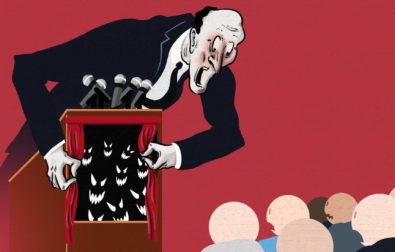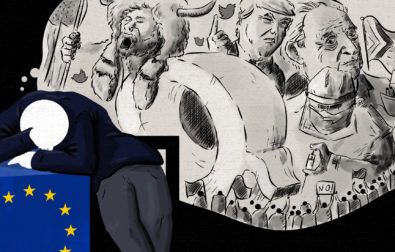“Where we go one, we go all.” QAnon conspiracists love cryptic slogans. They share this with the mysterious "Q", nom-de-plume of a supposed American secret agent who posted several messages referring to a “Big Storm” on the forum 4Chan in 2017. "Q" talked of Donald Trump's plan to lead a counter-coup against so-called "Deep State" elites, thereby giving rise to the QAnon movement in the US. For its followers, the Deep State, often mentioned by the American president, forms part of a paedophile network made up of the world's elites – all of which Donald Trump was soon to overcome.
Today, the rallying cry "Where we go one, we go all" – with its even more mysterious acronym "WWG1WGA" – has crossed the Atlantic to Europe. In Germany, the first signs date to 2018, when Q-initiated rumours of Hillary Clinton's incarceration were translated as the supposed upcoming arrest of German Chancellor Angela Merkel by Donald Trump.
Conspiracy theories and disinformation
- Right in the heart of Europe, a secret and influential disinformation network does Delhi’s dirty work
- A very Italian salsa of populism and conspiracy theories
- QAnon comes to Europe
- A wade through the swamp of Europe’s conspiracy culture
- How George Soros was transformed from herald of democracy into Hungary’s “enemy of the people”
- Andreas Önnerfors: ‘Conspiracy theories are the staple diet of populism in Europe’
German QAnon quickly became the second largest such group after the US. Since then QAnon has moved on to macro-scale conspiracies, highly adaptable to local contexts. German history provides fertile ground for such ideas. "Since Germany was liberated from dictatorship by the Americans, QAnon spreads the idea that the country will be liberated from Jews, women and scientists by another American president. It's a powerful narrative of history reversal", explains Michael Blume, Baden-Württemberg's Commissioner for Combating Anti-Semitism.
To help QAnon flourish in Europe, there has been no shortage of willing conspiracy gurus, often aided by far-right networks. One of the most influential figures, Oliver Janich, scored success – and riches – by relaying a video peddling an old antisemitic myth from the 15th century – the "adrenochrome harvest" – according to which the Jews were stealing blood from children. The Reichsbürger conspiracy movement, which claims that the Reich continues to exist and is threatened by the German state, has also been an important outlet across the Rhine. The phenomenon has been exacerbated by the Covid-19 pandemic, with all its uncertainties and excess hours spent in front of screens.
Between April and August 2020, QAnon content exploded. Research by the ISD Global think tank shows that among the top 15 sites reporting QAnon news, English was the most common language, followed by German, Italian and French. In Central and Eastern Europe, especially Poland, the Russian enemy keeps conspiracists busy enough to make QAnon superfluous.
Having fallen into the crosshairs of major platforms such as Twitter, Facebook and TikTok, QAnon has been quick to change its modus operandi. In the summer of 2020, a hijacking of the hashtag #SaveTheChildren, from the name of the children's rights NGO, led several hundred people into the streets of London, Bristol and Manchester. Without claiming to be from QAnon, the crowds were protesting against alleged child trafficking. Propelled by algorithms, the hashtag generated millions of interactions on social networks.
Conspiracy theories about paedophilia are not new. They were already flourishing in Europe during the Dutroux affair. Convicted in the 1990s for the kidnapping and murder of four young girls, Marc Dutroux was for some the victim of a corrupt justice system, condemned in place of others in mysterious paedophile rings involving politicians and the Belgian royal family. "The added value of QAnon is to offer a meta-narrative that federates conspiracy theories and brings up things that are bogged down in the public debate", says researcher Marie Peltier. “In the current political climate conspiracy has become a phenomenon of composites. QAnon embraces this dynamic."
“The added value of QAnon is to offer a meta-narrative that federates conspiracy theories and brings up things that are bogged down in the public debate”.
Marie Peltier
In the UK, just a few years after Operation Yewtree, a sprawling child-abuse investigation concerning BBC presenter Jimmy Savile, QAnon's recipe had no trouble catching on. In France, QAnon can thank far-right Canadian YouTuber Alexis Caussette-Trudel for spreading the movement's theories in French. The #Metoo movement and the accusations against model agent Jean-Luc Brunel in the Epstein affair have also provided a fertile breeding ground there for QAnon's fantasies. The anti-elite rhetoric has had little trouble catching on in the land of the Gilets Jaunes, and has since been fuelled by the government's bungling of the Covid-19 pandemic.
"In Europe, QAnon is systematically anchored in anti-elite theories, whereas in the United States a link can be made with religion", analyses Iris Boyer of ISD Global. But two events have put a damper on the rise of conspiracy theorists in Europe: the assault on the US Capitol in January 2021 by Donald Trump's supporters, including those of QAnon, and the subsequent swearing-in of the new President Joe Biden. The former event was followed by the mass closure of QAnon online accounts. The second was cause for disaffection among many QAnon activists, disappointed that the "Big Storm" did not materialize after the defeat of their candidate.
In Europe, the most radical followers went on to clandestinely infiltrate related interest groups, for example those dedicated to alternative medicine and antivax ideas. According to the "Big Reset" theory, a group of world leaders orchestrated the pandemic to take control of the economy. On the Telegram messaging service, the most important German-language groups are QAnon groups. VK, the Russian social network, is an alternative fallback platform.
In Italy, Roberto Bui of the Wu Ming collective is a keen observer of the movement. A fierce opponent of QAnon's theses, he helped write a novel, Q, published in 1999 and seen as the source of inspiration for the mysterious "Q"’s messages on 4chan. Bui notes that the movement is changing: "Most people don't call themselves QAnon any more since the Capitol assault. We've moved into a post-QAnon phase. If you don't use the name QAnon anymore, it's easier to recruit", he says.
With its limited reach and lack of organisation, the QAnon movement in Europe can hardly aspire to enter politics like its American counterpart.
An example is Father Livio Fanzaga, host on the pious Radio Maria. He disseminates QAnon theories by referring to secret cabals of Satanists, all without mentioning the name of the movement. In Italy, QAnon thrives on the far-right fringe of the Church. As in the rest of Europe, the movement has also spread to esoteric and New Age circles. This heterogeneity was already apparent at a demonstration in Berlin on 1 August 2020, when protestors opposed to Covid restrictions threatened to attack the Reichstag.
New demonstrations are planned for this summer, but they are expected to be much smaller, says Michael Blume. With its limited reach and lack of organisation, the QAnon movement in Europe can hardly aspire to enter politics like its American counterpart. In Germany, Michael Ballweg, a computer scientist and initiator of the Querdenken 711 movement, which was behind the August 2020 demonstration, ran for mayor of Stuttgart but got only 2.6% of the vote. The danger lies elsewhere: "Without a structure it is difficult to imagine any concrete acts, except by a lone wolf. On social networks, some individuals might go all the way and convince themselves to put the theories into action," warns Iris Boyer.

In collaboration with the Heinrich Böll Foundation – Paris
Do you like our work?
Help multilingual European journalism to thrive, without ads or paywalls. Your one-off or regular support will keep our newsroom independent. Thank you!



















